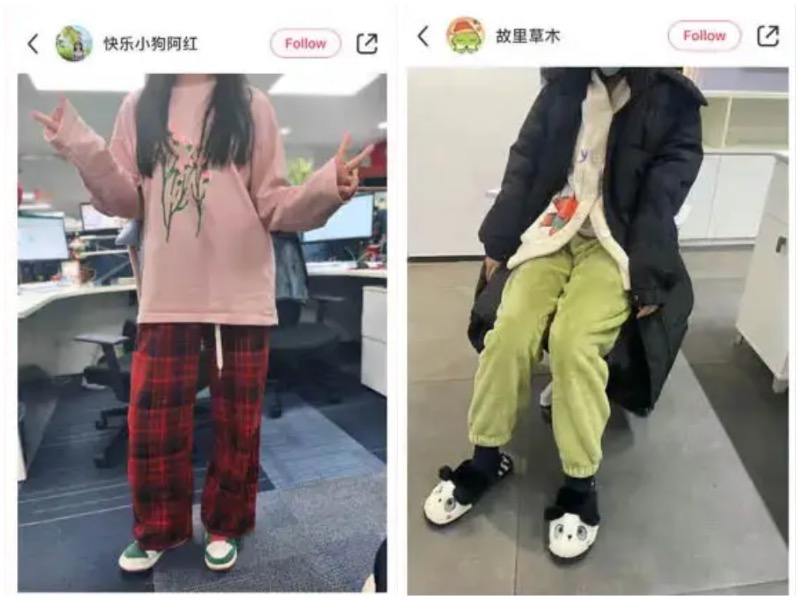Want to read in Dutch? Click here
Young people in China find dress codes old-fashioned. As a protest, they are wearing pyjamas, bathrobes, wool socks, and slippers to work. A remarkable trend, but not very exceptional. Because various studies have shown that people enjoy working in their pyjamas. Is it wrong for an employer to enforce dress codes? And is it best to allow nightwear in the office? I’ve delved into it.

It all started when a Chinese woman was approached by her employer. He found her dress too casual and sloppy. She was asked to wear something else so that ’the company’s image could be maintained.’ The woman posted a video about the incident on Douyin, a social media platform similar to TikTok. In it, she was seen wearing pyjamas, slippers, and gloves. She stated that she would wear this clothing to work.
The video quickly went viral under the name “rude outfits for work”. Especially on Weibo, similar to X (formerly Twitter), there was a lot of discussion. And now more and more Chinese young people are wearing sleepwear to work.
Chinese youth wearing pyjamas to work
During an interview with The New York Times, 30-year-old Cindy Luo explains why she participates in this trend. “I just want to wear what I want. (…) I just don’t think it’s worth spending money to dress for work, since I’m just sitting there.”
Luo says she often wears tailored sleepwear. She also doesn’t bother matching the shirt with the pants. And she’s not the only one speaking out. Also on Xiaohongshu, the Chinese version of Instagram, more and more young people proudly post photos of their outfits at work.

According to Ilse Verweij, HR expert and chair of the job application code committee, it’s not surprising that these young people are speaking out.
“China is a country where most people dress formally for work. I understand why young people are now resisting this. It’s important to show a piece of yourself at work. And clothing is a part of that,” says Verweij.
Not only Chinese people like to work in pyjamas
If you don’t live in China, this may sound like something that wouldn’t happen quickly in your country. But various studies have shown that more people work in pyjamas than we think. The difference is that it usually happens when working from home.
During the pandemic, only 46% of Americans exchanged their pyjamas for regular clothes when working from home. A small 20% of people also didn’t see a video meeting as a reason to dress up. About half of those surveyed felt productive when wearing their nightwear during work. In the Netherlands, we were also fond of it in 2020. A quarter of the people worked in pyjamas from home at least one day a month. Especially in large cities, people seemed to struggle to change at the start of the day.
Although the pandemic has long been over, some people don’t want to say goodbye to the pyjama as workwear. According to a recent British survey, a third of people still do this. On average, it amounts to 46 working days per year, but for one in 12 employees, this has even become standard work attire.
Will wearing pyjamas to work become the new norm?
With the above figures in mind, you might almost think that dress codes are outdated. Could a company attract more staff, for example, by allowing pyjamas? According to Verweij, that’s not the case.
“It’s important for companies to have certain guidelines in this area. Precisely to ensure that everyone knows what is expected and what standards apply. This way, you can prevent everyone from showing up in pyjamas at the office.
I don’t think allowing pyjamas in the office will add value. It might attract people in the short term, but the question is whether these people will stay. I compare it a bit to the trend of slides and ball pits in the office. Offering a good work-life balance and freedom are much more important. That’s how you can really add value as an employer.”
Give pyjamas a special place in your life
I think allowing pyjamas at work is indeed not a good idea. Maybe for the short term, but in the long run, it can cause problems. What do you say to customers who engage with someone in nightwear? Should you suddenly require your staff to come to work in regular clothes when they have external contacts? And what are the chances of smelling body odor?
Young people might think it’s a good idea now. It’s rebellious too. But ultimately, the difference between clothing at home and at work also creates a different mindset. When you wear formal clothing, it puts you in ‘work mode’. It’s also a good way to keep the separation between work and personal life clear. That applies to me exactly the same. Although I work alone as a writer, I still make sure to wear at least regular clothes when I go to work. It feels different in pyjamas. That pyjama is a reward for hard work when you come home at the end of the day. And let’s keep it that way. Because otherwise, it will lose its power over time.
What do you think of this new trend?
Greetings,
Aileen
